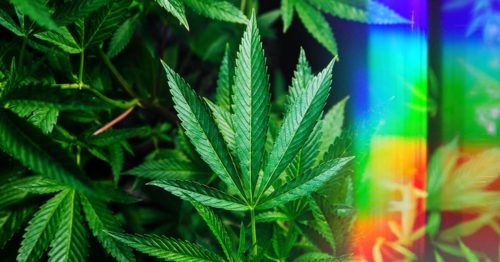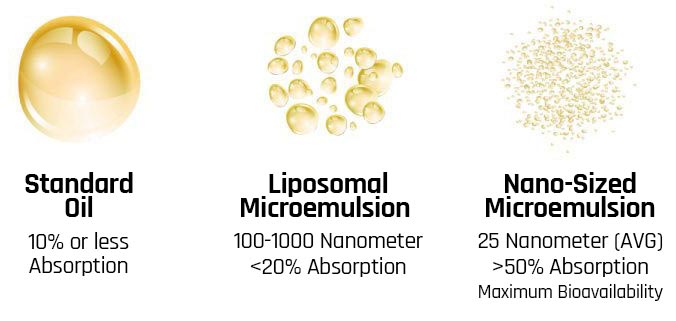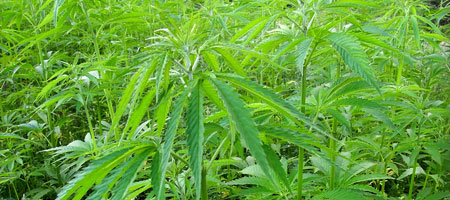 Shop
ShopBroad-Spectrum CBD Softgels
Broad-Spectrum CBD Oil Tincture
Full-Spectrum CBD Softgels
Full-Spectrum CBD Oil Tincture
CBD Gummies
CBD Balm
CBD Dog Treats
All Products >

If you're new to CBD, setting out to make your first purchase can be a daunting task. Today there are a large number of brands and products on the market and it can be hard to choose. In this article, we guide you through the process of finding a reputable brand selling quality products that meet your needs.
By the end of the article, you'll be an expert CBD shopper. You'll be able to help yourself and anyone you know choose high-quality, highly effective products.

What makes CBD products special is the inclusion of an extract derived from hemp that contains special chemical compounds found in cannabis. Not all products contain the same compounds, however, which is why it's important to understand the difference between them.
The different product types are defined using some standard labels called spectrums. These labels define the chemical makeup of the hemp extraction used in a product. Specifically, these spectrums are used to describe the cannabinoid and terpene content:

Also known as whole-plant extracts, full-spectrum products contain a wide range of cannabinoids and terpenes sourced from the original hemp plant. These products are known to offer the maximum potential therapeutic benefits as they contain the widest range of compounds available.
The issue with full-spectrum products for many is the presence of THC. While the THC levels are so slight that they won't get you high, they can still be an issue for those who are drug tested. Regular use of a full spectrum product can put you at risk of failing a test even though there are no psychoactive effects.
If you're not at risk of being tested and are comfortable consuming small amounts of THC, then a full spectrum product is a great choice, otherwise, you'll need to seek out an alternative spectrum.

As an answer to the THC issue with full-spectrum products, advances in hemp oil processing has resulted in the newest spectrum on the market: broad-spectrum.
These products contain the full spectrum of cannabinoids and terpenes found in the original hemp material. Through additional processing, all detectable amounts of THC are removed. The result is a product retaining the nearly complete therapeutic potential of a full spectrum product in an accessible THC-free form.
For the many who cannot or do not wish to consume THC, broad-spectrum is the ideal choice. This spectrum is considered superior to CBD isolate which was the only THC-free option on the market until broad-spectrum production technologies came online.

CBD isolate is created by processing a hemp extract to remove all plant material and compounds except CBD. The resulting crystalline material is an isolated form of the single cannabidiol molecule. Isolates can contain up to 99% concentrated cannabidiol and are versatile in their use despite their limited therapeutic profile.
Before broad-spectrum products were introduced to the market, CBD isolate was the only THC-free option. Unfortunately, by stripping all the terpenes and cannabinoids, isolates don't take advantage of the entourage effect. As a result, these products require a higher and more specific dose to be effective when compared to full or broad-spectrum.
As you browse the market you'll universally run into the three spectrums we outline above. Reputable brands will label the product spectrum clearly and back up these claims by providing lab reports that confirm the spectrum.
To make things simple, here is our advice for choosing the right spectrum for your needs:
For a more in-depth look at product spectrums and example lab reports, head over to our article on hemp extracts which covers the topic top to bottom.

Choosing the right type of product is important because the different methods of ingesting CBD have different levels of effectiveness, therapeutic properties, onset times, and durations. Below are the most popular major categories of products available today:
One important factor to consider when shopping by product type is if the product is 'water-soluble'. This term is often used to refer to products that utilize a nanoemulsion or liposomal delivery method. For products that are swallowed, they offer superior onset times and overall effectiveness when compared to oil-based products.
As an example, when traditional oil-based capsules are swallowed, as little as 10% of the hemp extract actually becomes active in the body. Most of the active compounds are flushed from the body.

When a process like nanoemulsion is applied to a help extract, the oil is broken into tiny particles, increasing surface area which helps aide absorption into the body. In the case of nanoemulsions, this can result in up to a 5x increase in absorption in the body. As a result, the onset times and effectiveness of ingested products increase, making them much more effective.
If you're planning on swallowing CBD, we highly recommend looking for a water-soluble product.
Now that you know which spectrum and type of product will suit you, it's time to choose a quality brand that carries what you're after. The CBD market is booming and lacking regulation which makes the quality of brands vary widely.
As a new consumer, this makes picking the right brand very important. The guidelines below will help you identify when a company is doing things right:
The first step in reviewing a business you're considering purchasing from is to look at the following aspects of their company:

You'll want to be sure that the company discloses information about where they source their CBD. Every product starts with hemp, so the source plant material needs to be free of harmful chemicals, pesticides, molds, and other contaminants. This, coupled with high-quality, professional extraction will result in a clean, pure end product.
Reputable companies will publicly provide the following information about their hemp source and manufacturing:

Transparency is the key to trust and in the CBD industry, lab reports are the ultimate form of transparency. These screenings provide you a glimpse into the product and will help you confirm it's potency and purity:
For more information on the topic, see our article on why CBD lab reports are important and how to read them.
![]()
If you've found a brand that passes the above audit, then you're probably good to go. You can take it a step further though, and look for validation from others that your choice is a good one. Look for product and brand reviews posted on independent, reputable sources that confirm your choices.

The lack of regulation and unstable start to the CBD industry caused a lack of consistency in price and quality in the early days. As time has moved on, things are beginning to stabilize, but there are still good and bad deals out there to watch out for.
When shopping for CBD, you'll want to know how to calculate the price per mg of CBD content in a product. This is a measure that allows you to compare how much you will spend per milligram of CBD from one product to the next. You'll need to know:
Once you have these two pieces of information, simply take the price and divide it by the total CBD content of a given product:
For example, let's use our 1500mg CBD Tincture which sells for $99.95. Using the price per mg equation we calculate the following:
Easy right? All you need to do is use this simple equation as you shop, comparing the price per milligram of CBD of the products you're considering. Generally, anything less than $0.10 / mg of CBD is a good deal, but it does vary by product type. We've broken things down even further in our article on the cost of CBD.

Knowing what to avoid can be just as important as knowing what to look for. Here are some warning signs to look out for when you shop for CBD:
While buying from your neighborhood CBD retailer is a great way to stimulate the local economy, it can be a tricky thing to navigate when it comes to CBD. Shopping on the web directly from a brand offers the benefit of allowing for close investigation without feeling pressured. If you choose to shop locally, be sure you do your due diligence.
We suggest choosing a retailer that is trusted and known for providing quality products and recognizable brands. Ask questions and request lab reports for the products you're interested in, and just like when shopping online, if something doesn't feel right, don't be afraid to pass.
-
Congrats on making it to the end of this lengthy guide. You should now have a complete understanding of why and how to choose a great CBD brand. Please don't hesitate to share this information with those you know! You can also find this same information in a condensed PDF format here which you can print for reference and share as you wish.
Here at Big Sky Botanicals, we strive to operate a business that we feel meets and exceeds these guidelines. We hope you'll consider shopping with us!
Hello!
I recently started working at a local health food store where we sell CBD. I am so grateful to have found your website to educate myself so I can better help our customers. Thank you!
In regards to your response to Pat above, if I see ingredients like MCT/coconut/other oil on an ingredient panel, does that mean the product went through lipid extraction rather than CO2/ethanol extraction?
And I notice some ingredient panels list "hemp oil." Is that totally different than CBD oil? Is there CBD in "hemp oil"?
Thank you so much!
Hello Jenn - Carrier oils like MCT/coconut etc are not indicative of the extraction method and are found in CO2/ethanol extracted products. These are added to CBD products to help the compounds in the extract absorb in the body and are often combined with the extract after extraction is complete. As for hemp oil as an ingredient, it's a broad term and needs further clarification to determine exactly what is in the product. Rather than explain that all here, I'll direct you to this article which explains the topic in-depth: https://bigskybotanicals.com/blog/cbd-oil-vs-hemp-seed-oil/
Thank you for the kind words and I am glad our educational resources are helpful!
Is there a major quality difference in Co2 extraction vs. Lipid? Very few use the latter but they do show 3rd party testing and lab results. Pricing is very reasonable because they claim the Co2 equipment is expensive. I have seen articles from Project CBD on extractions and they did not downplay Lipid method just said it's not used by most. What's your thoughts please.
Hi Pat - Lipid extraction pulls the compounds from hemp biomass into oils like MCT or veggie as a solution directly. CO2 and ethanol pull the extract as crude oil without additional lipids. As you mention, lipid extraction can produce clean extracts and some companies do use it. It is less proven than methods like CO2/ethanol and thus may be harder to produce at scale. Additionally, there may be issues around shelf life and further processing required to separate out the lipid source if you'd like to do anything other than an oil-based product with the extract. I'd agree with ProjectCBD and wouldn't downplay it, but those are some of the reasons why you're not seeing it as widely utilized as other methods. As you've done - regardless of extraction - always check the labs to verify the extract is potent, pure, and clean of residuals.